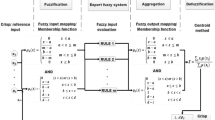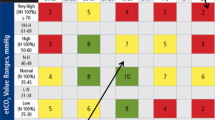Abstract
The purpose of the present study is to introduce a novel methodology for adapting and upgrading decision-making strategies concerning mechanical ventilation with respect to different disease states into our fuzzy-based expert system, AUTOPILOT-BT. The special features are: (1) Extraction of clinical knowledge in analogy to the daily routine. (2) An automated process to obtain the required information and to create fuzzy sets. (3) The controller employs the derived fuzzy rules to achieve the desired ventilation status. For demonstration this study focuses exclusively on the control of arterial CO2 partial pressure (paCO2). Clinical knowledge from 61 anesthesiologists was acquired using a questionnaire from which different disease-specific fuzzy sets were generated to control paCO2. For both, patients with healthy lung and with acute respiratory distress syndrome (ARDS) the fuzzy sets show different shapes. The fuzzy set “normal”, i.e., “target paCO2 area”, ranges from 35 to 39 mmHg for healthy lungs and from 39 to 43 mmHg for ARDS lungs. With the new fuzzy sets our AUTOPILOT-BT reaches the target paCO2 within maximal three consecutive changes of ventilator settings. Thus, clinical knowledge can be extended, updated, and the resulting mechanical ventilation therapies can be individually adapted, analyzed, and evaluated.






Similar content being viewed by others

References
Bates JH, Young MP (2003) Applying fuzzy logic to medical decision making in the intensive care unit. Am J Respir Crit Care Med 167(7):948–952
Boegl K, Adlassnig KP, Hayashi Y, Rothenfluh TE, Leitich H (2004) Knowledge acquisition in the fuzzy knowledge representation framework of a medical consultation system. Artif Intell Med 30(1):1–26
Bouadma L, Lellouche F, Cabello B, Taille S, Mancebo J, Dojat M, Brochard L (2005) Computer-driven management of prolonged mechanical ventilation and weaning: a pilot study. Intensive Care Med 31(10):1446–1450
Carlo WA, Pacifico L, Chatburn RL, Fanaroff AA (1986) Efficacy of computer-assisted management of respiratory failure in neonates. Pediatrics 78(1):139–143
Dojat M, Brochard L, Lemaire F, Harf A (1992) A knowledge-based system for assisted ventilation of patients in intensive care units. Int J Clin Monit Comput 9(4):239–250
Dojat M, Harf A, Touchard D, Laforest M, Lemaire F, Brochard L (1996) Evaluation of a knowledge-based system providing ventilatory management and decision for extubation. Am J Respir Crit Care Med 153(3):997–1004
Dojat M, Pachet F, Guessoum Z, Touchard D, Harf A, Brochard L (1997) NeoGanesh: a working system for the automated control of assisted ventilation in ICUs. Artif Intell Med 11(2):97–117
Dojat M, Harf A, Touchard D, Lemaire F, Brochard L (2000) Clinical evaluation of a computer-controlled pressure support mode. Am J Respir Crit Care Med 161(4 Pt 1):1161–1166
Hernandez-Sande C, Moret-Bonillo V, Alonso-Betanzos A (1989) ESTER: an expert system for management of respiratory weaning therapy. IEEE Trans Biomed Eng 36(5):559–564
Jandre FC, Modesto FC, Carvalho AR, Giannella-Neto A (2008) The endotracheal tube biases the estimates of pulmonary recruitment and overdistension. Med Biol Eng Comput 46(1):69–73
Jensen M, Lozano S, Gottlieb D, Guttmann J, Möller K (2008) An evaluation of end-tidal CO2 change following alterations in ventilation frequency. In: Vander Sloten J, Verdonck P, Nyssen M, Haueisen J (eds) Proceedings of ECIFMBE 2008, IFMBE, 22
Kacmarek RM, Venegas J (1987) Mechanical ventilatory rates and tidal volumes. Respir Care 32:466–478
Kwok HF, Linkens DA, Mahfouf M, Mills GH (2003) Rule-base derivation for intensive care ventilator control using ANFIS. Artif Intell Med 29(3):185–201
Lellouche F, Mancebo J, Jolliet P, Roeseler J, Schortgen F, Dojat M, Cabello B, Bouadma L, Rodriguez P, Maggiore S, Reynaert M, Mersmann S, Brochard L (2006) A multicenter randomized trial of computer-driven protocolized weaning from mechanical ventilation. Am J Respir Crit Care Med 174(8):894–900
Lozano S, Möller K, Brendle A, Gottlieb D, Schumann S, Stahl CA, Guttmann J (2008) AUTOPILOT-BT: a system for knowledge and model based mechanical ventilation. Technol Health Care 16(1):1–11
Miller PL (1985) Goal-directed critiquing by computer: ventilator management. Comput Biomed Res 18(5):422–438
Nemoto T, Hatzakis GE, Thorpe CW, Olivenstein R, Dial S, Bates JH (1999) Automatic control of pressure support mechanical ventilation using fuzzy logic. Am J Respir Crit Care Med 160(2):550–556
Rudowski R, Frostell C, Gill H (1989) A knowledge-based support system for mechanical ventilation of the lungs. The KUSIVAR concept and prototype. Comput Methods Programs Biomed 30(1):59–70
Schaublin J, Derighetti M, Feigenwinter P, Petersen-Felix S, Zbinden AM (1996) Fuzzy logic control of mechanical ventilation during anaesthesia. Br J Anaesth 77(5):636–641
Shahsavar N, Ludwigs U, Blomqvist H, Gill H, Wigertz O, Matell G (1995) Evaluation of a knowledge-based decision-support system for ventilator therapy management. Artif Intell Med 7(1):37–52
Sittig DF, Pace NL, Gardner RM, Beck E, Morris AH (1989) Implementation of a computerized patient advice system using the HELP clinical information system. Comput Biomed Res 22(5):474–487
Sun Y, Kohane I, Stark AR (1994) Fuzzy logic assisted control of inspired oxygen in ventilated newborn infants. Proc Annu Symp Comput Appl Med Care: 757–761
Tehrani FT (2008) Automatic control of mechanical ventilation. Part 1: theory and history of the technology. J Clin Monit Comput 22(6):409–415
Tehrani FT (2008) Automatic control of mechanical ventilation. Part 2: the existing techniques and future trends. J Clin Monit Comput 22(6):417–424
Tehrani FT, Roum JH (2008) Intelligent decision support systems for mechanical ventilation. Artif Intell Med 44(3):171–182
Tong DA (1991) Weaning patients from mechanical ventilation. A knowledge-based system approach. Comput Methods Programs Biomed 35(4):267–278
Acknowledgments
This work was supported by Bundesministerium für Bildung und Forschung (Grant 1781X08 MOTiF-A), and Dräger Medical, Lübeck.
Author information
Authors and Affiliations
Corresponding author
Rights and permissions
About this article
Cite this article
Lozano-Zahonero, S., Gottlieb, D., Haberthür, C. et al. Automated mechanical ventilation: adapting decision making to different disease states. Med Biol Eng Comput 49, 349–358 (2011). https://doi.org/10.1007/s11517-010-0712-0
Received:
Accepted:
Published:
Issue Date:
DOI: https://doi.org/10.1007/s11517-010-0712-0



